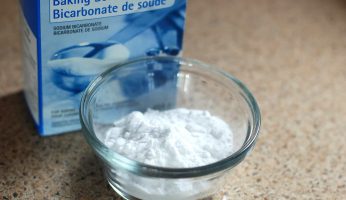Creatine vs BCAAs: Which One Should You Take?
Disclosure: We use affiliate links and may receive a small commission on purchases.
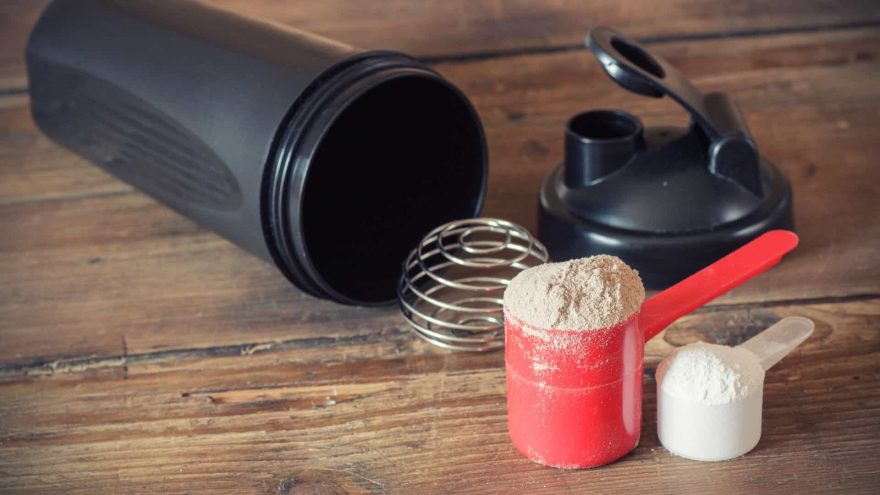 Creatine vs BCAAs: Which One Should You Take?
thefitbay.com
Creatine vs BCAAs: Which One Should You Take?
thefitbay.com
Both creatine and BCAAs have their place in your fitness regime, but how do you know when to take one or the other? Our guide will help you determine which supplement is right for you based on each’s unique properties and benefits.
Quick Answer
Creatine and BCAA supplements each have unique properties and benefits. Depending on your health and fitness goals, one supplement might be a better fit for you than the other.
Supplementing with creatine can ensure that you get the most out of your workout – before, by boosting your energy; during, by enhancing your athletic performance; and after, by reducing your recovery time and promoting muscle growth.
With BCAA supplementation, you may be able to achieve a leaner body composition by synthesizing protein, fueling your muscles for training and promoting fat loss.
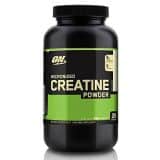
- Best Creatine
-
Our rating - Price: See Here

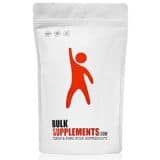
- Best BCAA
-
Our rating - Price: See Here

Workout supplements are in high demand for a good reason – they can be very effective at helping you reach your fitness goals. If you could boost your energy levels, chisel your physique, and work towards a stronger you, why wouldn’t you?
Reaping the benefits of health and fitness supplements is not as easy as popping them into your morning smoothie, however. You still have to do your part. That means making healthy lifestyle choices and exercising regularly. But workout supplements can still make a big difference in your gym performance and overall results.
With all the different types of supplements to choose from, it can be daunting to learn what kinds of supplement will work best for you. When you are trying to build and protect your muscles and power through a session in the gym, there are two types of supplements you need to know about: creatine and branched-chain amino acids (BCAAs).
What Makes Creatine and BCAAs Different from Each Other?
Creatine and BCAAs are seemingly similar, so knowing the difference is key to understanding when you should take one or the other to get your desired results.
Let’s start with what creatine and BCAAs have in common: they are both amino acids that can boost your energy levels, and they are both naturally found in the human body.
But What are Amino Acids?
When you consume protein, your body breaks it down and leaves behind amino acids. Amino acids are the building blocks of protein, which plays a vital role in nearly every bodily function.
The human body does not produce 9 of the 20 amino acids it needs on its own, so it is important to adopt a diet that is rich in protein and therefore rich in the nine essential amino acids. (1)
You can achieve this with foods that are naturally high in protein or protein powders, but supplements derived from amino acids cut right to the chase when you want the amino acids themselves.
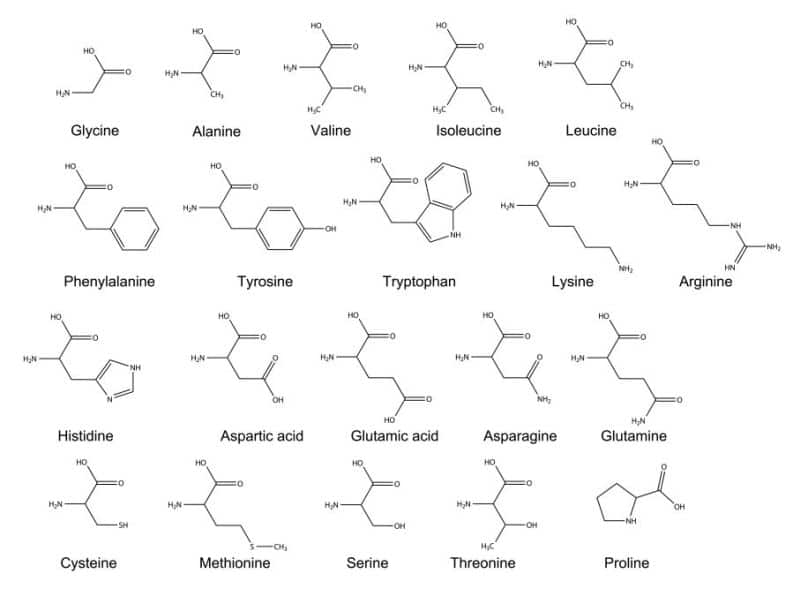
So How are Creatine and BCAAs Different if They are Both Amino Acids?
Every type of amino acid has distinct properties based on its shape, which affects the way it is absorbed and used by our body. Basically, the special shape of each amino acid determines its special properties.
Take BCAAs for example. BCAAs are not just regular amino acids – they are branched-chain amino acids. The key part of the name is branched-chain, because this is the shape that BCAAs take. Keep in mind that only three of the nine essential amino acids take this shape.
The difference between creatine and BCAAs is simply that the amino acids in each have different structures, functions, and benefits.
Which One is Right for Me?
Some people prefer creatine and others swear by BCAAs. Some people even take both of these amino acids supplements at various times during the day.
Your needs may vary from the needs of others, so it is best that you understand exactly what creatine and BCAAs are and the roles they play in your fitness routine.
What is Creatine?
Creatine is a tripeptide compound that is naturally found in the body and used to enhance exercise performance and increase muscle mass. It is made up of three amino acids:
Creatine is created in the liver, kidneys, and pancreas and is mainly utilized in the body’s muscle cells, but it is also used in the brain. (5) So, not only can creatine help make your muscles stronger through boosted athletic performance, it can also make your brain stronger (metaphorically speaking, of course). We will get more into that later.
Although creatine is found naturally in the body, consuming creatine-rich foods helps promote the body’s natural functions that rely on creatine. Foods like animal protein contain whole creatine, while plant proteins must be combined to get the three amino acids that make up creatine. Creatine can also be created synthetically in the laboratory.
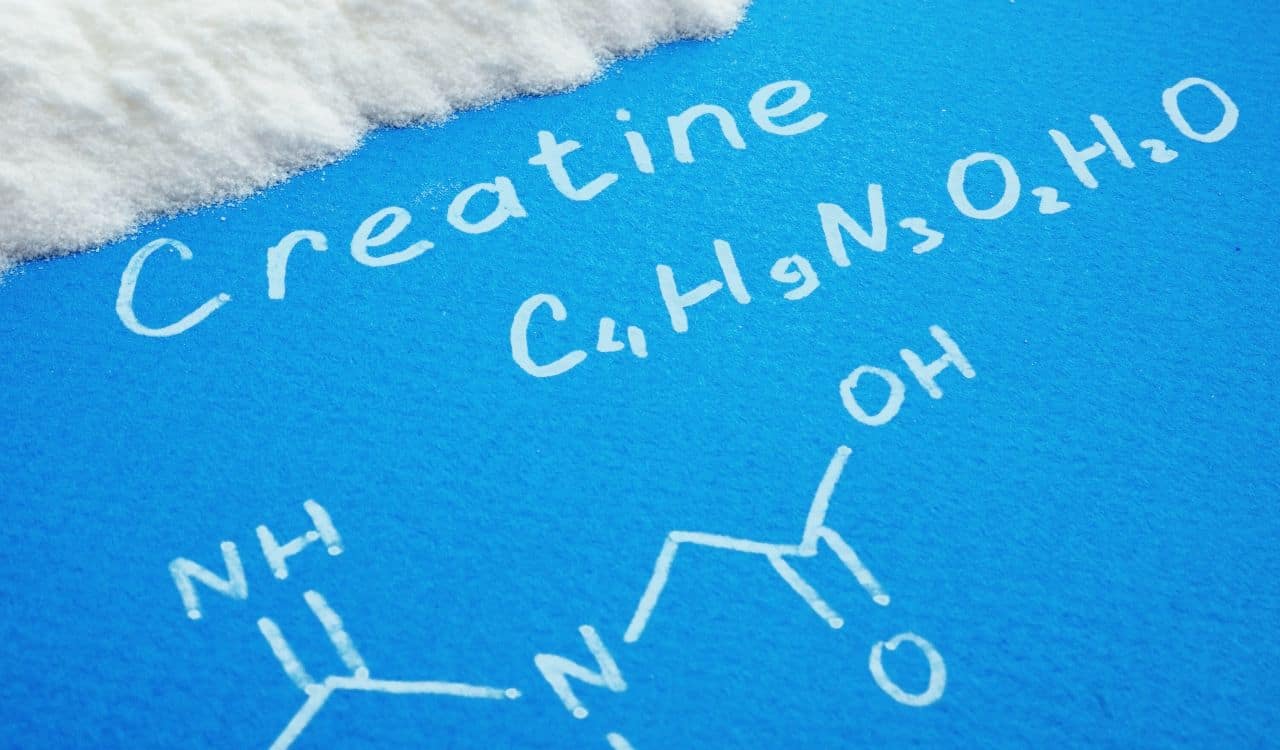
5 Main Benefits of Supplementing With Creatine
Creatine is mostly known for its exercise- and muscle-related benefits, but your brain benefits from creatine as well. When you supplement with creatine, the quality of your physical and mental activities is enhanced because you are running on increased energy. Some of the benefits of taking creatine will be felt immediately, while others happen on a cellular level and take more time to notice.
Let’s go more in-depth on the main benefits of supplementing with creatine:
1. Boosted energy
Creatine gives you an extra burst of energy before your workout. (6) Instead of going for an extra cup of coffee or guzzling an energy drink that is packed with artificial sugar, consider adding creatine to your protein shake or pre-workout smoothie.
This is how creatine boosts your energy:
The body’s natural energy source is adenosine triphosphate (ATP). When the body exerts energy, such as during a workout, the ATP is used and loses a phosphate. With one less phosphate, ATP becomes adenosine diphosphate (ADP). Until ADP gets another phosphate group to become ATP, it cannot produce energy.
This is where creatine comes in. Creatine donates a phosphate group to ADP so that it can become ATP. Creatine recycles ADP into ATP to boost the body’s natural source of energy. (7)
2. Protein synthesis
Protein is vital for the body to function properly, and protein synthesis is the process of regenerating new protein cells and balancing that out by exporting older protein cells. You can think of this process as the time it takes for muscles to grow.
Creatine, whether naturally sourced from the body or taken as a supplement, is involved in the protein synthesis of muscles in two ways. (8)
First, creatine is involved in the actual regeneration of new protein cells within your muscles by allowing you to train for longer. (9, 10) This is due to creatine’s direct role in ATP energy production.
Secondly, creatine pulls water into the muscle for hydration, which deters the degradation of the protein. This means that the protein cells will stick around for longer to synthesize.
Since creatine aids in protein synthesis, muscles will appear larger and protein cells in muscles will renew faster.
3. Enhanced athletic performance
There is nothing worse than feeling like you did not give your all during your workout. Maybe you did not have enough energy, or maybe your form was off. Either way, the quality of your exercise performance has a direct correlation with your results.
Creatine can increase the quality of your exercise by not only boosting your energy but helping you to perform better. (11)
Studies have shown that supplementing with creatine may improve the performance of various activities and exercise-related factors:
4. Increased muscle mass and strength
Of the 250 supplements tested in a 2002 study, only two were found to significantly increase lean muscle mass and strength gains. (19) One of them was creatine.
Creatine has an anabolic effect, meaning that it increases water content. (20) This is why you might experience noticeably larger muscles shortly after beginning to supplement with creatine. At first, this is not pure muscle mass – it is most likely water content.
Over time, creatine can yield larger and stronger muscles because of its involvement in exercise performance. Think of it like this:
More energy > Enhanced exercise quality > Increased muscle mass > Accelerated strength
Supplementing with creatine does not guarantee that your muscles will grow nor that you will become stronger. If you put in the work and take creatine as a supplement to your health and fitness regime, then you may be able to yield the muscle-related results you want.
5. Increased cognitive performance
Creatine is not all brawns – it is also brains. Brain function, that is.
Energy is used for physical exertion as well as neurological exertion. The brain has to tell the rest of the body what to do using communicators called neurotransmitters. This can be exhausting, especially when faced with difficult tasks. (21)
Creatine has been proven to enhance intelligence test scores and memory performance by supplying additional energy to the brain via ATP. (22) This is especially useful for vegetarians, who do not get additional creatine by eating meat, and elderly people, who often have declining memory performance. (23, 24)
Just like creatine delays fatigue after strenuous physical activity, creatine also prevents and reduces mental fatigue after strenuous mental activity. (25) Since we are constantly thinking, our brain utilizes approximately 20% of our energy stores each day. With the help of creatine, both our muscles and our brain have more ATP, and therefore energy, to power through.
Do the Risks of Taking Creatine Outweigh the Benefits?
There has been a lot of controversy surrounding the topic of creatine and whether or not it is safe to consume.
We know how important health is, so we would not recommend a product or supplement that could possibly do you harm. Supplementing with creatine is a natural and effective way to boost your athletic performance and reap some of its many other benefits.
How do we know for sure that creatine is not too good to be true?
More than 500 research studies have evaluated the effectiveness of creatine supplementation. (26) We have done our homework and gone through many scientific studies to ensure that the information we present to you is accurate.
Like many things in life, health professionals recommend taking creatine in moderation. Be sure to read the nutrition facts and packaging on your creatine supplement to know how much to take at a time.
PRO TIP: If creatine is upsetting your stomach, try taking less of it at once and take it with a meal.
What are BCAAs?
To put it simply, branched-chain amino acids (BCAAs) are three of the nine essential amino acids that share a branched molecular structure. These three essential amino acids include:
Because the body does not make BCAAs, it is essential to get them from dietary sources or supplements. Common dietary sources of BCAAs include animal products like meat and seafood and vegetarian sources like quinoa, nuts, and seeds. BCAA supplements can be derived from animal-based or plant-based sources.
What makes BCAAs so beneficial in fitness is that they’re broken down primarily in the muscles instead of the liver, where most amino acids are broken down. Having direct access to the muscles allows the BCAAs to be used as fuel before and during a workout and build the muscle fibers after a workout.
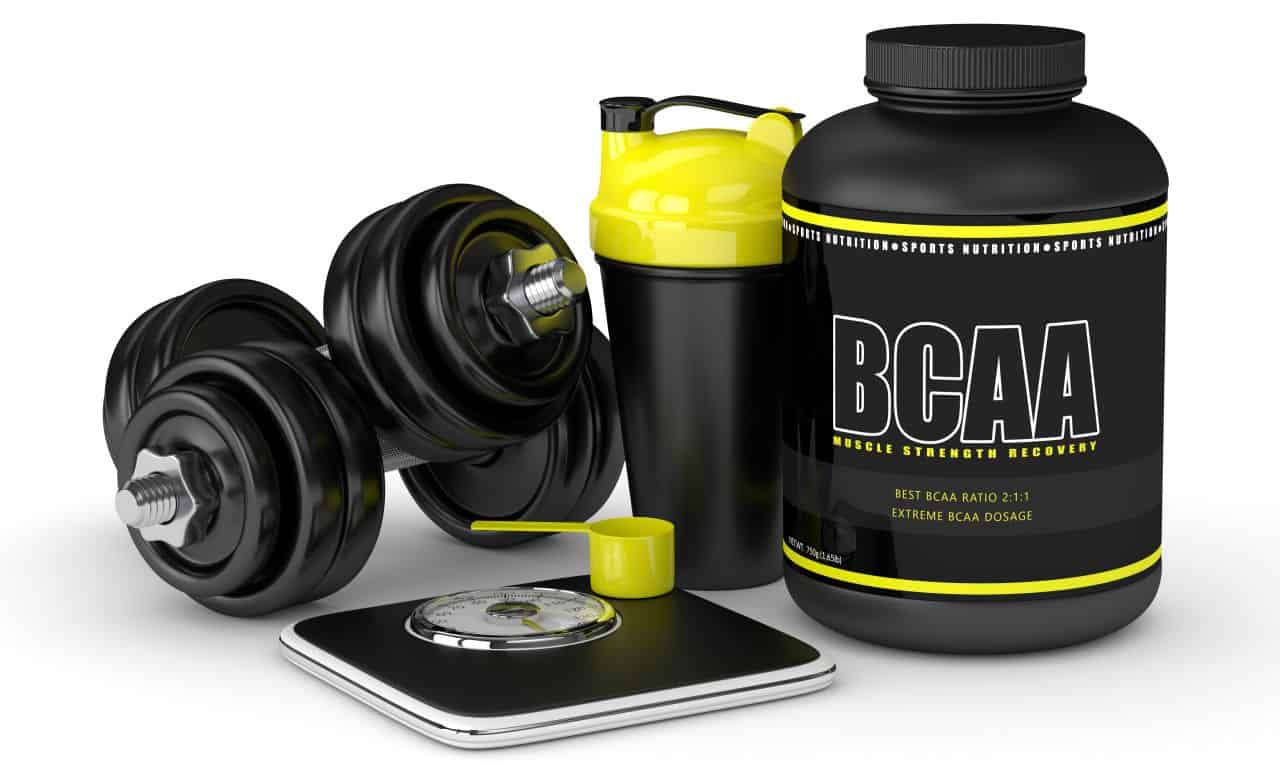
5 Main Benefits of Supplementing With BCAAs
If you’re getting enough protein in your diet, then you’re likely getting plenty of natural BCAAs in the foods you’re eating. This doesn’t mean that you don’t need or shouldn’t rely on supplemental BCAAs. Depending on your health and fitness goals, supplementing with additional BCAAs can push you in the right direction thanks their many benefits.
1. Improve athletic performance
Amino acids in the body are used to power through mental and physical exercise, which means they come in handy when you’re likely to burn through your amino acid storage during a workout. (29, 30) The longer you can keep your amino acid levels up, the longer your workout can last. BCAA supplementation can restore depleted amino acid levels to improve athletic performance so you can train for longer without sacrificing quality.
When you feel good about your performance in the gym, you might worry that all that exercise will result in soreness for many days after. Consuming BCAAs can reduce muscle damage and soreness, leading to increased recovery time. (31) With BCAAs, you may be able to spend more time in the gym instead of recovering and resting.
2. Increase protein synthesis & reduce protein breakdown
Similar to creatine, BCAAs contribute to protein synthesis and therefore muscle growth. (32) This is because BCAAs, especially leucine, activate key enzymes in protein synthesis after exercise. (33)
While the muscles are resting, BCAAs increase protein metabolism, so protein cells are regenerating faster and breaking down slower. This is the process by which muscle builds itself.
Studies show that BCAAs by themselves may not increase protein synthesis, but taking BCAAs with other nutrients, such as protein-rich foods or protein powders, helps BCAAs synthesize protein more effectively. (34)
3. Increase energy & reduce fatigue
Because BCAAs are mainly broken down in muscle, they play a key role in producing energy and reducing tiredness. (35) This helps you to perform longer while keeping your stamina up. The last thing you want during a workout is to let fatigue take over and compromise your performance.
Studies have shown that supplementing with BCAAs helps humans to train longer by boosting energy levels, reducing fatigue, and increasing endurance levels. (36, 37, 38) However, BCAAs may be more effective at reducing fatigue in people who do not train regularly versus trained athletes. (39)
4. Build and maintain muscle mass
Leucine is regarded as the all-star essential amino acid when it comes to building muscle and increasing body mass. It is especially helpful in high-intensity strength training like weight lifting as opposed to aerobic exercise like running.
Leucine is involved in the synthesis of protein – the regeneration of protein cells that results in building muscle tissue. (40) When protein is synthesized at a rate that is faster than protein degradation, muscle mass builds quicker. (41)
BCAAs are also proven to significantly increase lean muscle mass compared to other fitness supplements like whey protein and carbohydrates. (42)
5. May accelerate fat loss
While BCAAs may help increase muscle mass, they may also decrease body fat. This combination can result in a leaner body composition.
Consuming enough BCAAs in your diet from foods high in protein is associated with a lower risk of becoming overweight or obese. (43) When consuming BCAAs in supplement form, BCAAs can decrease body fat composition more than whey protein and carbohydrate supplements. (44)
A calorie-restricted diet is believed to be more effective at promoting fat loss when combine with a BCAA supplement than just restricting calories alone. (45)
Why Supplement with BCAAs When They are Found in Protein-Rich Foods?
BCAAs are more common in protein-dense foods than creatine, so it’s easier to get them in your diet. This is especially good to know for vegetarians and vegans, since they do not get creatine from animal products but can get BCAAs from plants.
Although you get BCAAs in your diet, they are so beneficial and effective that you might want to boost their unique properties by increasing your intake. It is much easier and quicker to take a BCAA supplement in one go than it is to eat an additional serving of protein in whatever form you choose. Supplementing with BCAAs is a quick and effective way to increase your intake of them, and therefore to reap the many benefits, without stuffing yourself with more food.
Many BCAA supplements are also derived from high-quality sources, so they may be higher quality than the foods you’re eating and may yield better results.
When to Choose Creatine?

- Optimum Nutrition
-
Our rating - Creatine Capsules
- Price: See Here


- BulkSupplements
-
Our rating - Creatine Monohydrate
- Price: See Here

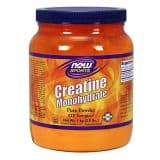
- NOW Foods Sports
-
Our rating - Creatine Monohydrate
- Price: See Here

If you’re choosing between creatine and BCAA supplements, go with creatine if you’re looking to bulk and gain strength.
Creatine encourages your muscles to work harder, which can result in heavier, longer training sessions, and therefore, more muscle mass gains. Creatine also draws water into the muscles, which can make them appear larger.
Go with creatine if strength and muscle mass are your primary goals.
When to take creatine?
It has been shown that creatine is most effective when performing short bouts of high-intensity physical activity. (46) Examples of this include sprinting, lifting weights, and bodyweight exercises like pushups.
If this sounds like your type of workout, taking creatine before you exercise can give you a boost of energy – mental and physical – and allow your muscles to reap the benefits during and after your workout.
When to Choose BCAAs?

- BulkSupplements
-
Our rating - BCAA Powder
- Price: See Here

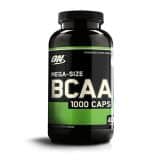
- Optimum Nutrition
-
Our rating - BCAA Capsules
- Price: See Here

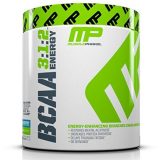
- MusclePharm
-
Our rating - BCAA Powder 3:1:2
- Price: See Here

If you’re choosing between creatine and BCAA supplements, go with BCAAs if you’re looking to lean out while building muscle density.
Because BCAAs contain three essential amino acids, taking a BCAA supplement can be very convenient when dieting or restricting calories. The only time you may not be getting enough protein, and therefore essential amino acids, in your diet is if you’re on a calorie deficit. In this case, BCAAs may nourish your body with the essential amino acids you need without going over your calorie limit.
BCAAs are typically the most cost-effective of the two supplements and be found in some protein powders.
When to take BCAAs?
Unlike creatine, BCAAs can be useful in aerobic exercises like cardio and high-intensity interval training (HIIT) as well as strength-training exercises.
BCAAs can be taken before, during, or after a workout. It is recommended to take BCAAs immediately before your training session to get the maximum fuel, or immediately after to promote muscle recovery.



